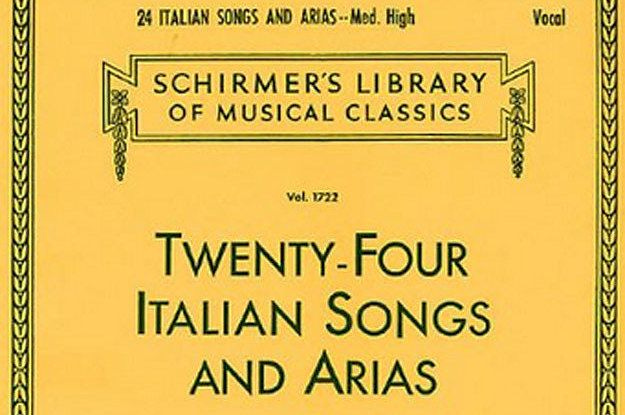Opera Daily 🎶 — The Songs We Love to Hate
"You will be one singer when you begin to study these. You will be another when you have completed them."
I love watching Luciano Pavarotti sing “Nel cor più non mi sento” from Giovanni Paisiello's 1788 opera La Molinara
Hello friends,
If you mention the “yellow book” to a current or former vocal student, they will know exactly what you are talking about.
The G. Schirmer edition of 24 Italian Songs & Arias is an anthology of songs new singers tackle when starting their vocal studies.
These songs are simple, but they are not easy.
Why do we continue to return to these songs when there is so much repertoire for young singers? I believe that these arias serve as the building blocks for legato (vocal line), breath control, communication, and agility. They help a student navigate what’s to come when they encounter a more challenging repertoire.
A couple of weeks ago, I started something called The Writing Studio. Instead of repetitions in the gym, we do our reps on the page. Every week we work on rhythm, storytelling, voice, structure, and other ingredients that make writing compelling.
My writing teacher breaks down the craft of writing like my voice teacher was doing with “the yellow book”.
At 17 years old, I wanted to sing the big arias far beyond my years and ability—the exciting stuff. I didn’t want to sing these boring little Italian tunes!
When my high school voice teacher assigned me “Nel cor più non mi sento”, she congratulated me on acquiring the book.
She told me that singers have learned to sing on these beautiful melodies for centuries because of one basic truism:
You will be one singer when you begin to study these. You will be another when you have completed them.
In honor of the craft of singing, I want to share some of my favorite singers singing selections from 24 Italian Songs & Arias.
"Se tu m'ami"
🎧 Listening Example (3 minute listen): Cecilia Bartoli, "Se tu m'ami" composed by Giovanni Battista Pergolesi (1710–1736)
"Se tu m'ami" (English Translation)
If you love me, sighing deep
For me alone, dear shepherd boy,
In your sufferings I take pity;
In your love I take great joy.But you think my love I'll give
To you alone? This you believe?
Foolish shepherd! See how quick
And easily you self-deceive!Silvia may likely choose
The pretty purple rose today,
But, lamenting thorns, tomorrow
That same rose she'll cast away.For myself, I see no reason
Men's vain counsel I must take;|
Just because I love the lily,
Other flowers I'll not forsake.
“Per la gloria d'adorarvi”
🎧 Listening Example (5 minute listen): Joan Sutherland, “Per la gloria d'adorarvi” from Griselda (1722) by Giovanni Battista Bononcini (1670-1747), London, 1961
“Per la gloria d'adorarvi” (English Translation)
For the joy of adoring you,
I want to love you, oh beautiful eyes.
In loving you, I will suffer but I will not cease to love you.
Yes, in my suffering.
I will suffer but I will love you, dear eyes
Without hope of you,
Futile affection is but longing,
But your sweet eyes,
Who could not help but admire them
And not love you?
I will suffer but I will love you, dear eyes
“Nina”
🎧 Listening Example (3 minute listen): Tenor Luciano Pavarotti singing “Nina” by Giovanni Battista Pergolesi (1710–1736), Salzburg, 1976
"Nina" (English Translation)
For three long days my Nina, my Nina, my Nina
Upon her bed has lain, upon her bed has lain
Louder and louder, ye players all, awaken my Ninetta
Awaken my Ninetta, that she may sleep no more.
Do you have a favorite from this book? Let us know in the comments!
Thank you for reading (and listening),
Michele
❤️ Enjoyed this piece? Hit the heart to like it. It helps others find Opera Daily.
📝A reminder that you can check out the complete Opera Daily archives and the playlist on YouTube for more selections. If you were forwarded this email by a friend, join us by subscribing:



Pavarotti recorded Beethovens' In Questo Tomba Oscuro which is unforgettable and deeply moving that students could sing as well.
Sadly, many voice teachers (mine included) do not tell their students that some of the works in the 24 Italian Songs and Arias come from actual operas of the 17th century. That is, the arias are part of an opera & that they fit within a larger narrative work with characters, emotions, etc. The great singers who still sing these songs and arias learn/know this and they bring all their craft to them. Pavarotti was one who performed these arias in recital. A great example is a recital one can fine on YouTube at the Brooklyn Academy of Music early in his career (https://www.youtube.com/watch?v=BPJisqcDgDg&list=PLNvlNmiC23ap6MZGghkDvFeZqwLE37rVM) and on Amazon (https://www.amazon.com/Luciano-Pavarotti-Recital-York-1973/dp/B0000019VI). In this recital the first THREE works are from the 24! A fascating glimpse of what these Song and Arias can become when approached with the right perspective. I wish that EVERY voice teacher would impress on their students their absolute seriousness as works of art (as they certainly were when they were written in the 17th century). I'll never forget hearing Pavarotti sing "Caro mio ben"!! What a revelation after having heard so many frestman voice students sing it (or attempt to sing it). Give those YouTube vidoes some time; you'll not regret it (only caveat is that the recording is by an audience member, I think, so that quality is lacking, but the sincerity of the performers is obvious).